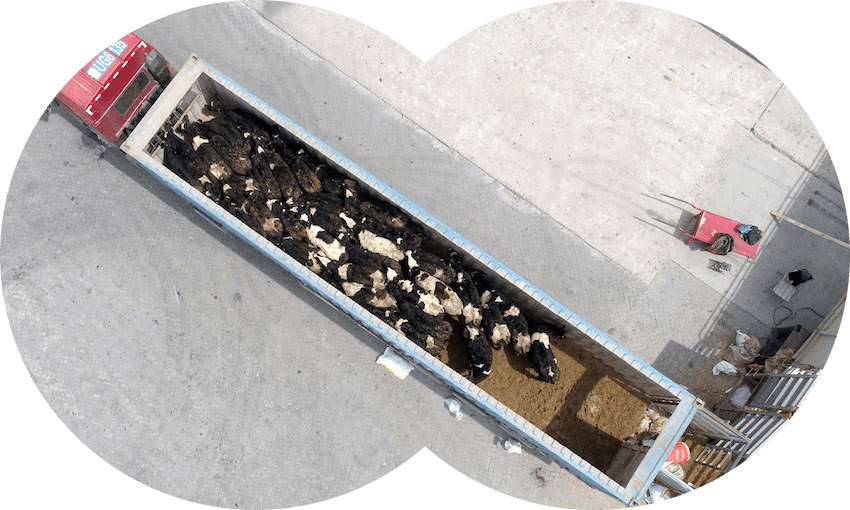The revelation that a lobby group has launched a pricey campaign to convince the government to restart live animal exports – something it’s already pledged to do – suggests the industry is worried. It should be, argues Marcelo Rodriguez Ferrere.
Like many, it was with the deepest of depressed sighs that I greeted the news that the resumption of live exports was an explicit part of the National Party’s coalition deals with New Zealand First and Act. The promise to each of the minor parties was identical: the government would “Reverse the recent ban on live animal exports while ensuring the highest standards of animal welfare”. New Zealand had only just banned the live export of cows, sheep, deer and goats by sea in April 2023. Less than year later, it felt like that significant progress was unravelling.
While depressing, however, it was hardly surprising. Immediately after the ban took effect, Christopher Luxon promised to reverse the ban so long as the practice met a “gold standard”. An Act MP submitted a member’s bill in March 2023 to reverse the ban before it had even come into effect, a move lauded by Federated Farmers. Federated Farmers’ president at the time, Andrew Hoggard, resigned from his post in May 2023, was successfully elected as an Act MP in October and is now the associate minister for agriculture (animal welfare). Hoggard is now responsible for whether live exports will indeed resume. Cool and normal.
Despite over half the country being opposed to resuming live exports by sea, given the consistency of the promises and the men who made them, it seemed inevitable that the government would reverse the ban. Even though it didn’t make the government’s 100-day plan, it was simply a matter of when, not if, live exports would resume.
It was thus with genuine surprise that I woke to the dulcet tones of Guyon Espiner informing me that industry itself wasn’t so sure that the resumption of the ban was a dead cert. In his excellent investigative reporting last week, Espiner revealed that a group, “Live Export New Zealand” (LENZ), had launched a “$1 million lobbying campaign to persuade the government to restart live animal exports”. That sum of money was needed because “without a major lobbying campaign, and a PR pitch to allay public concern about animal welfare standards, the government’s pledge could stall or even fail”. That’s a lot of money to persuade a government to do something they’ve pledged to do on countless occasions.
Why so spendy? Why so worried? Why does LENZ think it would need to persuade the government at all? After all, Minister Hoggard has said that resuming live exports was one of his top priorities in the portfolio and he wanted “progress with some haste”. Perhaps it’s something to do with that public concern. Perhaps because the longer this issue remains on the table and in the public consciousness, it’ll become a harder sell. Perhaps that’s why LENZ says it needs to employ a “social media counter-offensive” to build trust and understanding in the community (such counter-offensives being the traditional way to build trust).
After all, the community isn’t stupid. It knows about the MV Bahija, an Israeli-flagged ship carrying thousands of sheep that, with official permission, set sail from Western Australia on January 5, intending to sail through the Red Sea. For painfully obvious reasons, that was a bad idea, the ship has had to return to Australia, and those thousands of sheep have now remained on board in deteriorating conditions for weeks longer than they should. The community knows this isn’t even remotely the first time this has happened in Australia, and that such disasters happen to us: it was the sinking of the Gulf Livestock 1 in the East China Sea with 43 people and 6,000 New Zealand cattle on board that justifiably precipitated the ban in the first place.
The community have read that the SPCA – who know a thing or two about animal welfare – thinks that the promised “gold standard” of animal welfare is a shameful deception. Such a fantastical standard can’t prevent the inherent cruelty to animals that transport by sea inflicts or the substandard conditions they’ll face if they arrive; it can’t prevent conflict in the Middle East or a typhoon in the East China Sea. They’ve noted that the statutorily independent National Animal Welfare Advisory Committee “considers that the only way to fully protect animal welfare during and after livestock export is to implement a total ban”.
And finally, the farming community itself knows that prior to the ban, live animals represented 0.2% of primary revenue exports, meaning that a resumption will make only a few in the sector better off. They know any hit to New Zealand’s GDP is far outweighed by the reputational damage to the agricultural sector if the ban is reversed.
Huh. Now that I think about it, it isn’t surprising at all that the live export industry is worried. After all, whether you care about animals, New Zealand’s reputation or just feel a bit queasy about LENZ’s million-dollar lobbying campaign, there is a lot to hate about the resumption of live exports. Just don’t let the government know you hate it. That might just might change their mind, and poor old LENZ would have wasted all that money. What a shame that would be.
Marcelo Rodriguez Ferrere is an associate professor in the faculty of law at the University of Otago.





